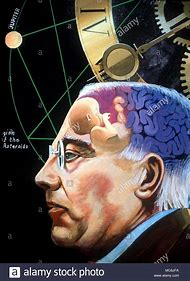The Fourth Way - Study of Oneself - P.D.Ouspensky-2






The Fourth Way - Study of Oneself - P.D.Ouspensky-2
We are made in such a way that we can live in four states of consciousness, but such as we are we only use two:one when we are asleep, and the other when we are what we call 'awake'-that is to say, in this present state, when we can talk, listen, read, write and so on. But there are only two out of four possible states. The third state of consciousness is very strange. If people explain to us what the third state of consciousness is, we begin to think that we have it. The third state can be called self-consciousness, and most people, if asked, say, 'certainly we are conscious!' A sufficient time or repeated and frequent efforts of self-observation is necessary before we really recognize the fact that we are not conscious; that we are conscious only potentially. If we are asked, we say. 'Yes, I am', and for that moment we are, but the next moment we cease to remembers and are not conscious.
So in the process of self-observation we realize that we are not in the third we remember to do it- because in this we depend on chance. When we remember, we must try to be aware of ourselves. This is all we can do.
Q. Must you be able to state of consciousness, that we live only in two. We live either in sleep or a waking state which, in the system is called relative consciousness. The fourth state, which is called objective consciousness, is inaccessible to us because it can only be reached through self-consciousness, that is, by becoming aware of oneself first, so that much later we may manage to reach the objective state of consciousness.
So, at the same time as self-observing, we try to be aware of ourselves by holding the sensation of 'I am here' -nothing more.And this is the fact that all Western psychology, without the smallest exception has missed. Although many people came very near to it, they did not recognize the importance of this fact and did not realize that the state of man as he is can be changed-that man can rember himself, if he tries for a long time.
It is not a question of a day or a month. It is a very long study, and a study of how to remove obstacles, because we do not remember ourselves, we are not conscious of ourselves, owing to many wrong functions in our machine, and all these functions have to be corrected and put right, these periods of self-remembering will become longer and longer, and if they become sufficiently long, we shall acquire two new functions.
With self-consciousness, which is the third state of consciousness, we acquire a function which is called higer emotional, although it is equally intellectual and emotional such as there is on the ordinary level. And when we come to the state of objective consciousness we acquire another function which is called higher mental. Phjenomena of what I call supernormal psychology belong to these two functions; and this is why, when I made those experiments twenty-five years ago, I came to the conclusion that experimental work is impossible, because it is not a question of experiment but of changing one's state of consciousness.
I have just given you some general ideas. Now try to tell me what you do not understand, what you wish me to explain better. Try to ask any questions you like, either in relation to what I said or your own questions.
It that way it will be easier to make a start.
Q. To attain the higher state of consciousness it is necessary to be permanently aware of oneself?
A. We cannot do that, so there is no question of being permanently aware. We can only talk now about the beginning. We must study ourselves in connection with this division of different functions when we can-when we remember to do it-because in this we depend on chance. When we remember, we must try to be aware of ourselves. This is all we can do.
Q. Must you be able to be conscious of your instinctive functions?
A. Only of the senses. Inner instinctive work does not need to become conscious. It is conscious for itself, independently of the intellectual function, and there is no need to increase this.We must try to become conscious of ourselves as we see ourselves, not for our innner functions. After some time we may become aware of certain inner functions of which it is useful to be aware; but not yet. You see, we do not acquire any new feelings. We only classify better our ordinary impressions, the ordinary things we get from life, from people, from everything.
Q. Would it be correct to say that when learning anything like driviong a car, intellectual function tells moving function what to do and that, when proficient, moving function works by itself?
A. Quite right. You can observe many things like that. First you learn by intellectual function.
Q. How important is the knowledge gained by watching our physical actions? Is this merely an exercise for watching our minds?
A. No, it is very important because we mix many things and do not know the causes of many things. We can understand causes only by constant watching for a long time.
Q. May we have instruction about how to work on each of the four functions?
A. All that will be explained, but for the present, and for a long time, you can only observe.
Q.Would it be an example of different "I's working when one goes to bed late and fully decide to go to bed early next night and, when night comes, does otherwise?
A. Quite right, one 'I' decides and another has to do it.
Q. How do we set about being more conscious ourselves?
A. This is quite simple to explain, although it is very difficult to achieve.Ther are no roundabout ways. A better state can only be achieved by direct effort, just by trying to be more conscious, by asking oneself as often as possible, 'Am I conscious or not?'
Reference: P.D Ouspensky: The Fourth Way
Articles-Popular
- Main
- Contact Us
- Planetary Existences-2
- Planetary Existences
- TWO REVELATIONS-2
- Jeffery Epstein - The Saga - 9
- Jeffery Epstein - The Saga - 8
- Jeffery Epstein - The Saga - 10
- The Two Revelations
- The Fourth Way - Study of Oneself - P.D.Ouspensky
- Impeachment Investigators Subpoena White House - Ukraine
- Universality of Initiation
- The Path Of Initiation
- Initiation and the Devas
- The Participants In The Mysteries-2
- The Fourth Way - Wrong Functions - P.D Ouspensky
- The Final Initiation
- Statues are a mark of honour. Like Edward Colston, Cecil Rhodes and Oliver Cromwell have to go
- Discipleship - Group Relations - 2
- The Probationary Path - 2
- The Participants In The Mysteries
- Discipleship - Group Relationships
- Discipleship
- The Succeeding Two Initiations
- Jeffery Epstein - The Saga - 7
- Jeffery Epstein - The Saga - 6
Articles - Latest
- They Lied to Us! The Truth They Hid About Hitler’s Death — Gerard Williams
- Ramaposa Dragged Out of Parliament
- Madagascar Goverment Collapse
- The Reality of Digital Id
- Welcome To The End Of Western Dominance
- Why is the Sahel turning its back on France?
- Sarkozy gets 5 years in prison in Gadhafi case
- The EU in 2025: A union at the crossroads of chaos
- Deep distrust of EU leaves Italy's Meloni in a corner over bailout fund
- Regime crisis in France: Bayrou falls, now Macron must go!
- Idi Amin president of Uganda
- Anger at Starmer's 'surrender deal' that hands Spain control over Gibraltar border
- Iran doubles down as US signals Israel could strike during nuclear talks
- What could have caused Air India plane to crash in 30 seconds?
- WW3 fears explode as Britain now Russia's 'enemy number 1' - even ahead of Ukraine





